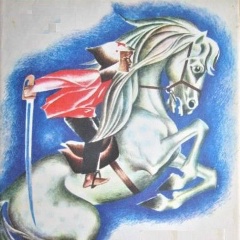#Lenin150Challenge
По условиям челленджа надо понравившиеся мысли Ленина пересказывать своими словами, и очень интересно наблюдать, кто что из идейного наследия выделяет.
В этом мы уподобляемся соратникам Ленина: после его смерти чуть не каждый отметился своей трактовкой основных идей вождя. Известнее всего, конечно, сталинский вариант, который издавался и переиздавался под скромным названием "ленинизм".
Я же хочу предложить вам изложение Ленинизма в трактовке Керженцева. Оно обладает двумя достоинствами: во-первых, Керженцев не был претендентом на трон, ему был меньший резон "гнуть" Ленина в какую-то нужную ему в политическом плане сторону. Во-вторых, об этой книге в предисловии очень тепло отзывается Крупская - для меня это некая гарантия качества.
Ну и отчёт, да. Сегодня читал "от штурма к осаде" - речь в октябре 1921 года, через полгода после ввода НЭПа. Ленин там в очень деликатном положении: надо объяснять соратникам, что поворот к НЭПу был правильным, и в то же время предыдущая политика, от которой отвернули, тоже была правильной. Он говорит, что "наскоком" в коммунизм попасть не удалось, но узнать это было, не попробовав, совершенно невозможно. Говоря о развитии НЭПа, он констатирует, что товарообмена не получилось, а получилась купля-продажа, и значит государству надо заниматься регулированием торговли, банковскими делами и т.п. Здесь начинает звучать тема, которая позже станет главной - о неготовности аппарата к решению этих задач, неумению наладить дело, неспособности распорядиться возможностями, которые открывает НЭП.
Закончив с основными статьями периода НЭПа, я откатился во времена брестского мира и прочел "О революционной фразе" и "Странное и чудовищное". Думаю, надо уже от статей перейти к работам и браться за "Детскую болезнь". В статьях обратил внимание, что Ленин пристально следил за результатами выборов в Советы, и на этой основе вывел момент, когда можно было захватить власть. Т.е. весь активизм базировался на аккуратной (по тем меркам) политической социологии.
Ленин там говорит о революционной фразе, а именно повторении лозунгов без учета объективных обстоятельств. По-моему, это вообще главный бич всех леваков. Никак не умеем или не хотим "приземлить" общие рассуждения на конкретные обстоятельства.
По условиям челленджа надо понравившиеся мысли Ленина пересказывать своими словами, и очень интересно наблюдать, кто что из идейного наследия выделяет.
В этом мы уподобляемся соратникам Ленина: после его смерти чуть не каждый отметился своей трактовкой основных идей вождя. Известнее всего, конечно, сталинский вариант, который издавался и переиздавался под скромным названием "ленинизм".
Я же хочу предложить вам изложение Ленинизма в трактовке Керженцева. Оно обладает двумя достоинствами: во-первых, Керженцев не был претендентом на трон, ему был меньший резон "гнуть" Ленина в какую-то нужную ему в политическом плане сторону. Во-вторых, об этой книге в предисловии очень тепло отзывается Крупская - для меня это некая гарантия качества.
Ну и отчёт, да. Сегодня читал "от штурма к осаде" - речь в октябре 1921 года, через полгода после ввода НЭПа. Ленин там в очень деликатном положении: надо объяснять соратникам, что поворот к НЭПу был правильным, и в то же время предыдущая политика, от которой отвернули, тоже была правильной. Он говорит, что "наскоком" в коммунизм попасть не удалось, но узнать это было, не попробовав, совершенно невозможно. Говоря о развитии НЭПа, он констатирует, что товарообмена не получилось, а получилась купля-продажа, и значит государству надо заниматься регулированием торговли, банковскими делами и т.п. Здесь начинает звучать тема, которая позже станет главной - о неготовности аппарата к решению этих задач, неумению наладить дело, неспособности распорядиться возможностями, которые открывает НЭП.
Закончив с основными статьями периода НЭПа, я откатился во времена брестского мира и прочел "О революционной фразе" и "Странное и чудовищное". Думаю, надо уже от статей перейти к работам и браться за "Детскую болезнь". В статьях обратил внимание, что Ленин пристально следил за результатами выборов в Советы, и на этой основе вывел момент, когда можно было захватить власть. Т.е. весь активизм базировался на аккуратной (по тем меркам) политической социологии.
Ленин там говорит о революционной фразе, а именно повторении лозунгов без учета объективных обстоятельств. По-моему, это вообще главный бич всех леваков. Никак не умеем или не хотим "приземлить" общие рассуждения на конкретные обстоятельства.
# Lenin150Challenge
According to the terms of the challenge, Lenin’s favorite thoughts must be retold in his own words, and it is very interesting to observe who distinguishes what is of the ideological heritage.
In this we are compared to Lenin's comrades-in-arms: after his death, almost everyone was noted for his interpretation of the leader’s main ideas. The most famous, of course, is the Stalinist version, which was published and reprinted under the modest name of "Leninism."
I want to offer you an exposition of Leninism in the interpretation of Kerzhentsev. It has two advantages: firstly, Kerzhentsev was not a contender for the throne, he had a lesser reason to “bend” Lenin in some direction he needed politically. Secondly, Krupskaya speaks very warmly about this book in the introduction - for me this is a kind of quality guarantee.
Well, the report, yes. Today I read "from assault to siege" - a speech in October 1921, six months after the introduction of the NEP. Lenin is in a very delicate situation there: he must explain to his comrades-in-arms that the turn to the NEP was right, and at the same time, the previous policy, which was turned away, was also right. He says that it was not possible to get into communism “in a hurry”, but it was completely impossible to find out without trying. Speaking about the development of the NEP, he states that the exchange of goods did not work, but the sale and purchase turned out, which means that the state needs to deal with the regulation of trade, banking, etc. Here the theme begins, which will later become the main one - about the machine’s unpreparedness to solve these problems, the inability to establish business, and the inability to manage the opportunities that the NEP opens up.
Having finished with the main articles of the NEP period, I rolled back in the days of the Brest peace and read "On the revolutionary phrase" and "Strange and monstrous." I think it’s already necessary to move from articles to works and take on "Childhood Disease." In the articles, he drew attention to the fact that Lenin closely monitored the results of the elections to the Soviets, and on this basis brought the moment when it was possible to seize power. Those. all activism was based on accurate (by that standards) political sociology.
Lenin there speaks of a revolutionary phrase, namely the repetition of slogans without taking into account objective circumstances. In my opinion, this is generally the main scourge of all leftists. We do not know how or do not want to “land” general reasoning on specific circumstances.
According to the terms of the challenge, Lenin’s favorite thoughts must be retold in his own words, and it is very interesting to observe who distinguishes what is of the ideological heritage.
In this we are compared to Lenin's comrades-in-arms: after his death, almost everyone was noted for his interpretation of the leader’s main ideas. The most famous, of course, is the Stalinist version, which was published and reprinted under the modest name of "Leninism."
I want to offer you an exposition of Leninism in the interpretation of Kerzhentsev. It has two advantages: firstly, Kerzhentsev was not a contender for the throne, he had a lesser reason to “bend” Lenin in some direction he needed politically. Secondly, Krupskaya speaks very warmly about this book in the introduction - for me this is a kind of quality guarantee.
Well, the report, yes. Today I read "from assault to siege" - a speech in October 1921, six months after the introduction of the NEP. Lenin is in a very delicate situation there: he must explain to his comrades-in-arms that the turn to the NEP was right, and at the same time, the previous policy, which was turned away, was also right. He says that it was not possible to get into communism “in a hurry”, but it was completely impossible to find out without trying. Speaking about the development of the NEP, he states that the exchange of goods did not work, but the sale and purchase turned out, which means that the state needs to deal with the regulation of trade, banking, etc. Here the theme begins, which will later become the main one - about the machine’s unpreparedness to solve these problems, the inability to establish business, and the inability to manage the opportunities that the NEP opens up.
Having finished with the main articles of the NEP period, I rolled back in the days of the Brest peace and read "On the revolutionary phrase" and "Strange and monstrous." I think it’s already necessary to move from articles to works and take on "Childhood Disease." In the articles, he drew attention to the fact that Lenin closely monitored the results of the elections to the Soviets, and on this basis brought the moment when it was possible to seize power. Those. all activism was based on accurate (by that standards) political sociology.
Lenin there speaks of a revolutionary phrase, namely the repetition of slogans without taking into account objective circumstances. In my opinion, this is generally the main scourge of all leftists. We do not know how or do not want to “land” general reasoning on specific circumstances.
У записи 77 лайков,
7 репостов,
1456 просмотров.
7 репостов,
1456 просмотров.
Эту запись оставил(а) на своей стене Алексей Сафронов


































































